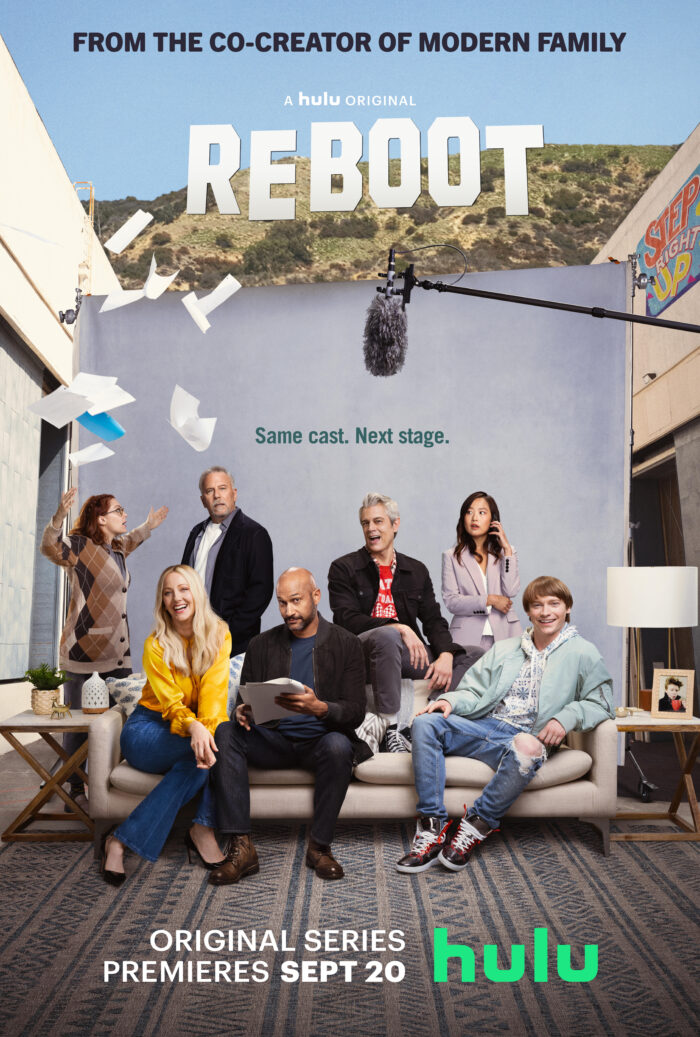There’s a tongue-in-cheek, meta drive to Reboot that is both a brilliant opening to comedy and a purposeful alienation of a lot of viewers, which is itself a doorway to a lot of potential. The result, at best, is to put yourself, as a series, in the position of predicting an exact audience, and you better be good at it.
Reboot is a behind-the-scenes look at an attempt to reboot an early 2000’s sitcom “Step Right Up” with the original cast, none of whom really went on to anything bigger and better. It’s a theory that is already equal parts flies and ointment, but the big roadblock is that the up-and-coming writer behind the idea, Hannah (Rachel Bloom), turns out to be the daughter of the original’s creator, Gordon (Paul Reiser). Though Hannah had the greenlight to modernize the comedic stylings of the largely goofball original, Gordon shows up, because he owns the show, and decides he wants to run the reboot himself. The cast convinces Hannah to stay and try to work with her estranged father, and worlds collide and hilarity ensues.
The show aims to throw its characters into uncomfortable situations and make fun of everything and there doesn’t seem to be any end to the targets, especially as each character serves as a multitude of possibilities and the premise lends itself to taking shots at not only people who might have been fans of the original (the kind of show for which Full House is perhaps the prime example), but those who may be fans of “this show”, this show, television series generally, and everyone who makes any of them.
Reed Sterling (Keegan-Michael Key) laments his time on “Step Right Up”, which he found hokey, blames for his inability to get serious roles, and notes that if spaghetti was in the script, it was probably going to end up on his head, but he needs the work and loves Hannah’s much more serious take on the characters. But, when Gordon turns back up, he’s ultimately in anyway, because something is better than nothing and it probably works for his particular stage of life however much he may look down his nose at his only claim to fame.

Similarly, former stars: Bree Marie Jensen (Judy Greer), Clay Barber (Johnny Knoxville), and Zack Jackson (Calum Worthy), all have certain hesitations, but really want the job. Bree married the King of a small, Nordic country, but that’s fallen apart and she has few prospects. Clay is a shock comic with a floundering career and was always somewhat out of his element just showing up to life. Zack tried to parlay his child star status into something bigger with a series of low-budget, movies for kids, but it only netted him a strange relationship with his mother.
What makes the show so difficult to endorse, despite the overabundance of “easy comedy” roads, is its unwillingness to be “for” anyone. Its entry for potential audiences comes only by being against the same set of things, and that set seems to include almost everything. Gordon is unlikable, sure, but Hannah is soon simply a stereotype herself, or perhaps a diagnosis, and everyone else is continually fleshed out as whatever the first impression of them may be. Clay, for example, is a womanizing manchild, and while in a certain sense he’s a nice enough guy, the first few episodes do little but reiterate his existence as stereotype.
And oddly enough, that’s exactly why the show drips with so much potential and deserves an audience it is all but guaranteed never to achieve. Heaping levels of meta upon meta, it’s a show very much like the one Hannah was after, that turned her father’s original on its head. The cheesy, family-friendly, “wholesome” characters and the pratfalls that moved them mindlessly around a few hopeful laughs were just as much stuck in their stereotypes, and, Reboot perhaps suggests, that’s because we can all actually be summarized and we manage to be people anyway.
The comedy is rough, and Keegan-Michael Key sets the stage for how it works in one of the shows many meta/”not-quite-breaking-the-fourth-wall” moments when he comments on Hannah’s script and how, even though you won’t laugh out loud, it’s one of the funniest things he’s ever read. When the show finally takes us into the writer’s room, with Gordon and his cabal of “old-timers”, and Hannah’s crew of young writers who cannot be described without using “neo” or quotes, it’s a cringeworthy dissection of what comedy is, and why anyone would watch any of the potential scenes this group or any of its members might spit out. Gordon is content with idea that falling is funny, and doesn’t need any analysis of the fact. Hannah’s side of the table wants to know the psychosis responsible for thinking falling, and crudeness generally, could be funny. Then Hannah falls and it’s up to us to figure out how everyone can think it’s funny.
Reboot wants you to wonder just what the hell is really the referent of its title and it manages that feat best by giving its stars room to fit their signature styles and abilities into something that ultimately is most similar to a philosophical treatise on what comedy is, without landing on any answer. It comes down to a familiar routine of agonizing, awkward situations and the reactions to same. Key is a bit frantic and overdramatizes “out of my depth” reactions. Reiser flip-flops between deadpan and Henny Youngman. Bloom simply spills her world onto the screen as though things might become animated at any moment while the zeitgeist attempts to crush her with hollow references. Greer is a walking reference chart of varying emotional upheavals.
The episodes progress as endless arguments over what makes something comedy, and the idea that what may be the most comedic is the fact that we keep showing up here, what with all the tragedy. It’s the same sort of high-jinx as you find in sitcoms, only there’s less “misoverhearing” and more accidentally sleeping with someone’s mom, and every moment wants you to really think about why you laughed, or want to hit Gordon.
The two sides of the table aren’t likely to agree often on what makes good comedy, but what’s funny is being able to see people.




